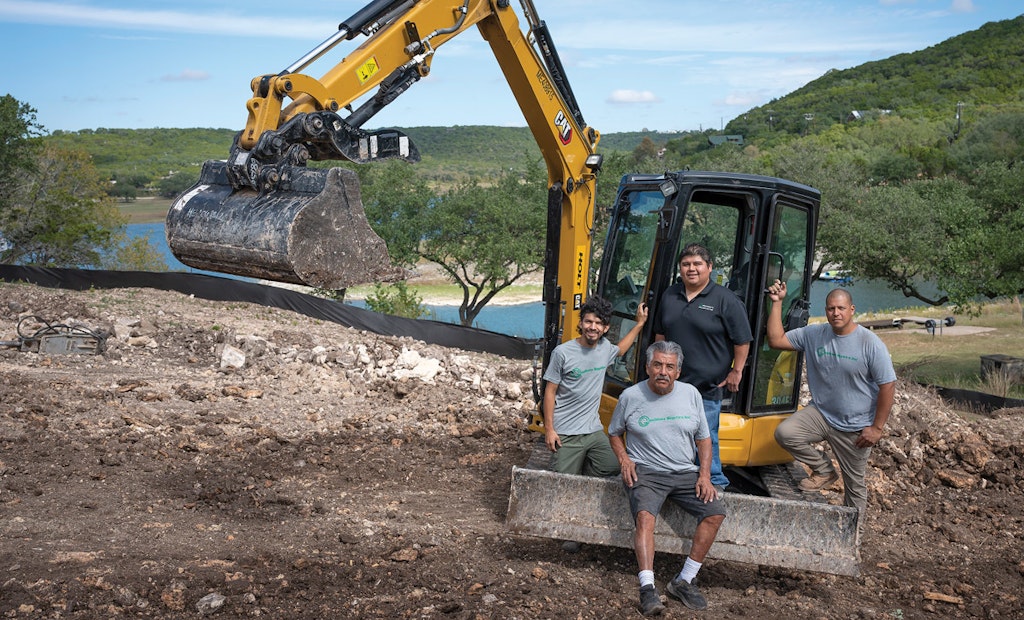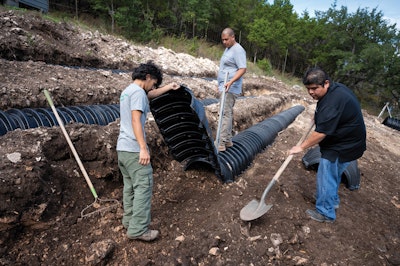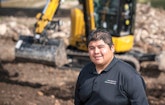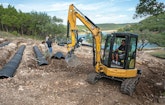
Orlando Godinez, top center, with technician Alex Aguilar-Murillo, left, lead technician John Ibarra, right, and father Pedro Godinez on a job site in Austin, Texas. They are shown with a Cat excavator. (Photos by Ethan Rocke)
Interested in Systems/ATUs?
Get Systems/ATUs articles, news and videos right in your inbox! Sign up now.
Systems/ATUs + Get AlertsSeptic system installers who run across difficult excavation conditions will sympathize with what Orlando Godinez routinely faces as the owner of Godinez Septics in Austin, Texas.
About a third of the time, Godinez and his employees install systems in solid rock, either granite, dolomite or limestone that’s indigenous to the Hill Country region around Austin. As a result, it can take up to two weeks to install a system and the process is difficult and labor-intensive, he says.
“I talk to people in other parts of the country who do two to three installations a week,” says Godinez, 38. “When we hit rocky conditions, we can do only one in about two weeks, which includes pauses for inspections.
“I’ve actually been pushing local engineers to spec out shallower tanks to avoid as much drilling as possible, which saves us time and saves customers money on rock-drilling charges,” he adds.
To excavate the rock, workers use a chisel attachment on the company’s Caterpillar excavators.
“It’s like a jackhammer, but on a larger scale,” he explains.
Quick-coupling devices allow employees to efficiently change from the chisel attachment to a bucket attachment, needed to scoop up the rock debris.
Sometimes Godinez gets lucky and the rock breaks out smoothly in large chunks. Other times, the going is a lot tougher, with crews able to remove only inches of rock at a time. “Sometimes we have to hit the rock over and over again until it breaks,” he notes. “It can be slow, laborious work.”
As such, Godinez is happy when the initial digging on a job site reveals no rock. “When we hit soft loam, we’re always pleasantly surprised,” he says.
CAREER U-TURN
Hard work is nothing new to Godinez. He follows the example set by his father, Pedro Godinez, who’s worked in the excavation industry for more than 50 years and now is a Godinez Septic employee.
Godinez grew up in the industry; he recalls his father filling an excavator bucket with water so Godinez could cool off in a “pool” on hot summer days in Texas.
Ironically enough, however, the elder Godinez initially discouraged his son from entering the excavation field.
“He didn’t want my brothers and me to follow in his footsteps and work outdoors in the heat,” Godinez says. “He felt we should get an education and get white-collar jobs.”
So Godinez earned an associate’s degree in general studies at Austin Community College, then embarked on a career in insurance and financial consulting.
“But I didn’t like being cooped up in an office — stuck indoors in one place all day,” he says. “After years of doing that, it kind of wore me out. I also wanted more control over my career.”
So against his father’s wishes, Godinez established Godinez Septics in 2014.
“It didn’t pan out the way my father wanted it, but he’s happy about it now,” he says. “And I don’t regret being initially talked out of joining the excavation industry because my other jobs helped me build a good foundation for the administrative side of my business and helped establish a lot of business connections.
“Also, since I’m a relative newcomer to the industry, I look at things with a totally different take.”
FROM THE GROUND UP
Godinez started out by doing small system repairs and pumping septic tanks while also working at a part-time job until the new business was firmly established.
“We started out very small and niche-oriented,” he says. “We basically started from scratch — an unknown company in a competitive market. It was just me, my brother, Pedro and a used pump truck.”
But bolstered by some of his father’s business contacts and a digital marketing program including a website and social media — Facebook and Instagram — the business slowly grew.
“We didn’t impose a trip charge to do estimates for customers, which I believed helped us get business because more established companies charged minimum fees just to show up,” he explains. “So that put us in front of other companies when customers shopped around.”
Godinez also used contacts he’d established in the insurance industry to get work from real estate agents needing septic system inspections and repairs prior to sales.
DIGGING IN
Godinez’s father joined the company in 2017, which allowed Godinez to fulfill his goal of installing septic systems. “It always was my goal to branch out into more than just pumping and small repairs,” he says.
“It was my brother’s idea to start out with pumping because there was a strong need for it,” he explains. “Plus it was a good way to get our name out there in front of as many people as possible.
“It was a little bit of a different approach, but it was a good way to gain entry into the installation market, once we had the equipment and the expertise,” he continues. “Installations are my favorite thing to do.”
Furthermore, Godinez’s brother — who no longer works for the company — had experience pumping septic tanks. In addition, doing pumping first required a less significant investment than buying excavation and other equipment, he points out.
INVEST FOR PRODUCTIVITY
The company has increased its sales revenue by about 40% each year since it was established, Godinez says.
“We’ve been blessed to have a lot of repeat business and word-of-mouth referrals, which enabled us to reduce advertising costs,” he explains. “We always invite people to share their experiences by writing reviews on social media platforms. The three biggest growth factors are word-of-mouth referrals, online reviews and our focus on customer service — following through on what we say we’re going to do.”
Investments in equipment also aided growth. Today the company owns a vacuum truck built out by Best Enterprises on a 2020 Peterbilt 337 equipped with a 2,300-gallon, stainless steel tank and a Masport Hydra vacuum pump (407 cfm).
For excavating, the company relies on Caterpillar equipment, including six tractors, three excavators, a mini-excavator and two skid-steers. All three excavators have a thumb grapple for brush/tree removal.
In addition, the company owns a Ford F-750 dump truck.
A HOT MARKET
Austin is at the center of a regional real estate building boom, which also has driven the company’s growth. Godinez says about half of the company’s system installations are for new homes and the rest are replacing failing systems at existing homes.
“We installed 13 systems in 2019 and 26 in 2020,” he says. He expected to nearly double the number again in 2021. The company typically installs more compact aerobic drip systems to accommodate a trend toward bigger houses on smaller lots.
“People want a house, a guesthouse and a pool, all on a half- or quarter-acre lot,” he explains. “So a lot of the time we put in aerobic drip systems in front or side yards — wherever we can squeeze in a leachfield. Sometimes you have to be creative.”
Godinez prefers Aqua Aire aerobic treatment units from Ecological Tanks, Infiltrator Water Technologies products and pumps from Ashland Pump.
Godinez expects demand for advanced treatment systems to increase, due to trends toward stricter effluent-treatment guidelines, stemming from Austin’s proximity to lakes, rivers and the massive Edwards Aquifer, one of the world’s largest artesian aquifers.
“The population boom will bring in even more homes, which I feel will require more use of advanced treatment systems,” he says.
HIRING CHALLENGES
While Godinez expects his company will continue to grow, he also realizes difficulties in finding quality employees can hamper business expansion. To contend with that problem, he tries to focus on fewer projects with higher profit margins as opposed to doing more lower-margin projects.
As a result, the company focuses on specialty projects that can be handled with existing staff — clients with expensive lakeside properties situated on challenging lots in terms of size and steep grades.
“Those kinds of projects might take twice as long to complete, but we can charge a premium for them,” he notes. “We’re fortunate to live in an area where clients that want the best service are willing to pay top dollar for quality work.”
As he finds more employees, the company then could shift toward a more volume-oriented business model, he explains.
“We’re pretty picky about who we bring on board because it’s our reputation that’s on the line,” he says. “Employees don’t necessarily need a lot of experience — we can teach them what they need to know. But they have to be willing to work hard.
“We’ve been very fortunate in finding those kind of people through our friends and family — people like me who wanted a career change,” he continues. “We also use quality part-time workers as needed.”
THE FUTURE IS BRIGHT
When asked what he sees for his company, say, five years down the road, Godinez says he envisions a highly skilled team of installation technicians taking on the most challenging projects, with pumping and repair work continuing to serve as entrees to those jobs.
“Every time we to get in front of someone, whether it be for pumping, maintenance, repairs or inspections, it’s an opportunity to show what we can do,” he says. “It’s what keeps the pipeline full for installation work.”
Whether further growth occurs or not, Godinez knows one thing for sure: Leaving the white-collar world behind was the right move — even if it wasn’t what his father initially wanted.
“I really enjoy being able to work with my family,” he says. “And I love that there never seems to be a dull moment in this business. I’ve never regretted leaving that cozy office job.”








